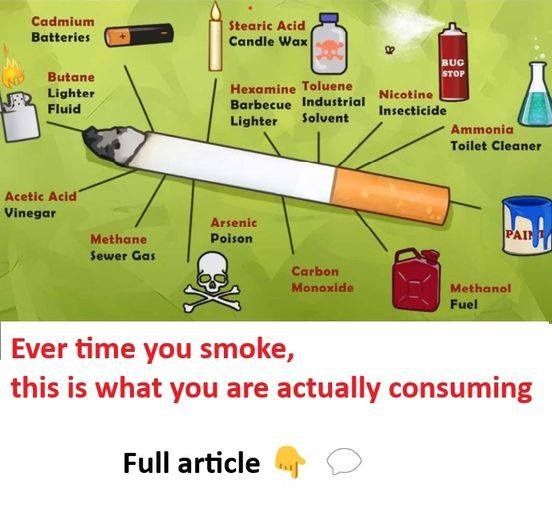Cigarette smoking is a culturally significant practice that dates back thousands of years. Smoking, especially cigarette smoking, exposes the body to a multitude of hazardous toxins, despite the social and historical importance of the habit. Nicotine and tar are well-known carcinogens, but cigarettes also include a frightening assortment of compounds that are more often found in industrial and home items.
If you light up a cigarette without realizing what you’re inhaling, you may be able to kick the habit for good. In this article, we will explore the common and disturbing uses of some of the harmful chemicals included in cigarettes.
An Element for Batteries: Cadmium
One of the most prevalent heavy metals used in battery production is cadmium. It is known to be carcinogenic and very poisonous, with the potential to severely harm the kidneys. Cigarette smoke contains cadmium, and breathing it in adds to the body’s buildup of the metal, which may cause serious health problems down the road.
A Less Dense Fluid:
Butane
A lighter fluid made of the very combustible gas butane. Cigarette smoke contains this flammable chemical, which makes it more dangerous. Various health complications, including respiratory disorders and more serious systemic impacts, may be caused by inhaling butane.
Chlorine: Wastewater Gas
Cigarette smoke also contains methane, a molecule that is a main ingredient in sewage gas. Its use in cigarettes contributes to the mix of dangerous gases that smokers inhale, although it is less hazardous than other compounds on this list.
The Dangers of Arsenic
As a powerful toxin, arsenic is well-known. It has several industrial uses, including in insecticides. Multiple cancers, heart disease, and diabetes are among the many health complications that may develop from even low levels of arsenic exposure over time.
Ammonia: A Cleaner for Toilets
A lot of typical home cleansers, particularly those for the toilet, include ammonia. Cigarettes include it to increase the addictiveness of nicotine by facilitating its absorption in the lungs. Ammonia is irritating to the respiratory system and may make asthma symptoms worse if inhaled.
Rocket Fuel: Methanol
One of the many uses for the alcohol known as methanol is as a rocket fuel. Inhalation, ingestion, or dermal absorption can result in severe toxicity. Metabolic acidosis, brain impairment, and death may result from exposure to methanol.
Hexamine: Fire Starters for Grills
Barbecue lighters and camping fuels include hexamine. When burnt, it gives forth poisonous smells. Hexamine is harmful to the respiratory and central nervous systems when inhaled via cigarette smoke.
Candle Wax: Stearic Acid
One of the fatty acids used in making candles and other wax goods is stearic acid. Inhaling it may nevertheless add to smoking’s hazardous consequences, even if it’s less toxic than some of the other compounds mentioned.
Acetic Acid: An Ingredient in Vinegar
Cigarette smoke contains acetic acid, the same chemical that gives vinegar its distinct flavor and aroma. When breathed in, acetic acid irritates the nasal passages, throat, and eyes, and long-term exposure may lead to respiratory issues.
The Industrial Solvent Toluene
Industrial solvents like toluene are found in products like adhesives, paint thinners, and nail polish removers. Toluene is an additional layer of the harmful effects of cigarette smoke that may induce vertigo, migraines, and neurological damage when inhaled.
An Addict’s Devotion to Nicotine
One of the most addictive substances in cigarettes is nicotine. It makes you feel good because it triggers the release of dopamine. But nicotine addiction makes quitting a challenge since it increases tolerance and dependency. Heart disease and hypertension are both exacerbated by nicotine’s effect on the cardiovascular system.
Different Types of Carbonate
A number of sectors make use of carbonates, including calcium carbonate, in their operations, including building and manufacturing. Cigarette smoke contains carbonates, which irritate the respiratory tract and make existing lung problems worse.
All Things Considered
Cigarette smoke is a deadly cocktail due to the mixing of these substances. From respiratory troubles and cardiovascular illness to different types of cancer and systemic toxicity, each drug contributes to a wide spectrum of health concerns. The chance of developing serious health problems and overall life expectancy are both greatly increased by chronic inhalation of these substances.
Importance of the Conclusion
The severity of smoking’s effects on health is brought home by learning about the whole range of dangerous compounds in cigarettes. Cigarettes include several other compounds, both commonplace and uncommon in industry and the home, in addition to the more obvious nicotine and tar. This information has the potential to dissuade smokers from picking up the habit a

